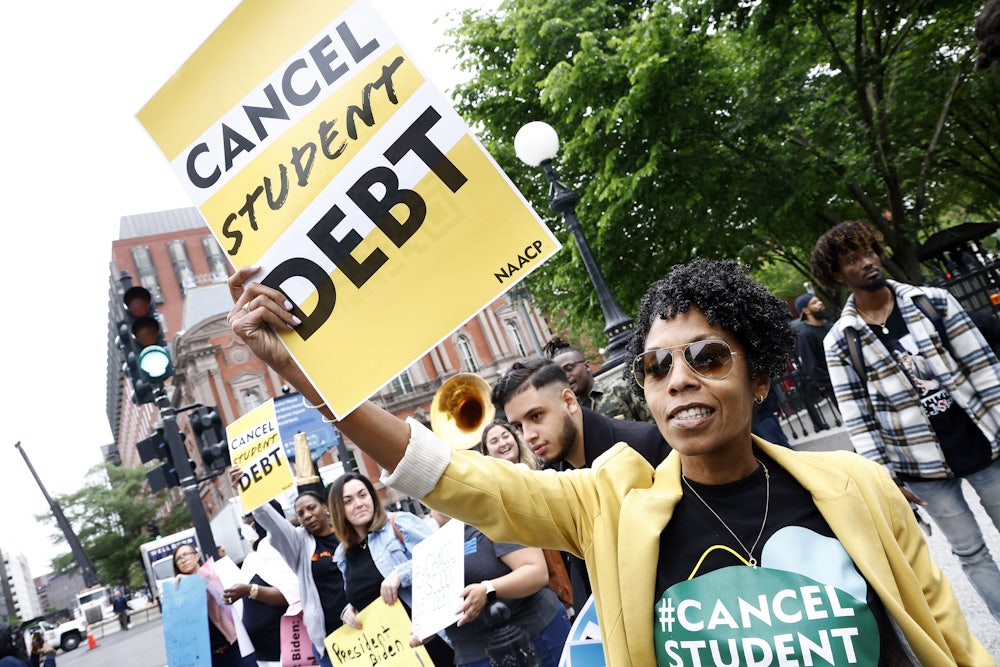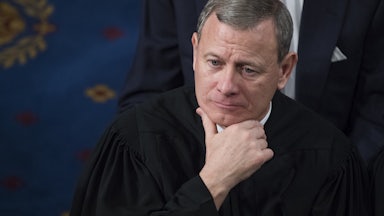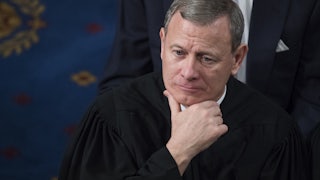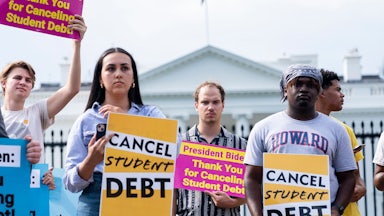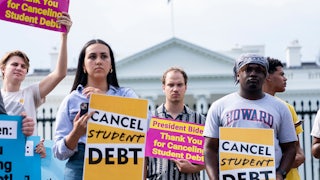When I last wrote about President Joe Biden’s student debt relief order, the big question was whether anyone would have the legal standing to challenge it in court. These days, it is almost inevitable that major presidential policy items from both parties will face some sort of legal battle. Conservatives have certainly taken issue with Biden’s use of a 2003 student loan reform law—and its apparently sweeping language—to wipe out, by one estimate, more than $400 billion worth of debt over the next three decades.
But the constitutional and statutory concerns might ultimately be meaningless if nobody has standing to bring a lawsuit in the first place. And at first, it seemed unlikely that anyone would. It was doubtful that any of the student loan debtors would sue to block it—and even if they did, that just raises the question of how debt relief could possibly count as an “injury” in a legal or practical sense. Right-wing figures like Texas Senator Ted Cruz admitted it would be an uphill battle to challenge the order.
A lawyer in Indiana, however, may have found a way to cut that Gordian knot. Frank Garrison, who works as a constitutional law litigator for the conservative Pacific Legal Foundation, filed a lawsuit earlier this week to block the Biden administration’s student debt order. It is unclear whether he will ultimately prevail in court. But his effort does underscore the lengths to which conservatives will go to defeat something that materially improves people’s lives—and the irony of their path to get there.
According to the complaint, Garrison took out a series of student loans and Pell grants to pay for his college education. After completing law school, he began working at public-interest law firms, such as the Pacific Legal Foundation. That qualified him for the federal Public Service Loan Forgiveness program. In exchange for working in a “public interest” field for 10 years, qualified participants are able to get their monthly loan payments capped based on their income. The remaining portion of their loans is then forgiven at the end of the 10-year period.
Biden’s order, according to Garrison, will wipe away $20,000 worth of his student loan debt. He was on track to have all of it forgiven in just over four years from now. Garrison claimed that, under Indiana tax law, the $20,000 reduction will be taxed as income and he will have to pay roughly $1,000 for it. He described this as a net loss for himself and for other potential plaintiffs in at least six other states where he said the tax codes are similarly structured.
“Because Mr. Garrison otherwise intends to seek forgiveness under PSLF and has limited monthly payments under IDR, a $20,000 reduction in his total indebtedness will not change either his monthly payment obligation or the total amount of the loans he must repay,” he claimed in his complaint. “[The administration’s] loan cancellation will cause Mr. Garrison to incur a financial obligation that he would not otherwise have faced.”
What is the proposed remedy here? In his complaint, Garrison said that he wants a federal court to block the loan forgiveness order in its entirety. “Nothing about loan cancellation is lawful or appropriate,” he argued. “In an end-run around Congress, the administration threatens to enact a profound and transformational policy that will have untold economic impacts. The administration’s lawless action should be stopped immediately.”
Most of his criticism was centered on what he sees as the Biden administration’s misreading of the Heroes Act, a 2003 law that allows the secretary of education to make broad changes to student loan programs during national emergencies. (I discussed that law and its implications at greater length here.) He also claimed that the Biden administration violated the Administrative Procedures Act when it crafted the order, and raised a potentially long-shot claim that the 2003 law violated the nondelegation doctrine.
Other legal commentators have already discussed the strengths and weaknesses of this particular lawsuit. Slate’s Mark Joseph Stern described some of the procedural hurdles for the complaint at this stage, as well as some more substantive legal challenges that Garrison will have to overcome if he wants to defeat the entire relief order. Stern noted, for example, that even if Garrison prevails, a federal judge might simply block Biden’s order to the extent that it affects those in his shoes, instead of blowing up the entire thing.
It’s also worth noting that the Biden order hadn’t been finalized when Garrison filed his lawsuit and that the White House said yesterday that it would allow any would-be beneficiary of the student loan forgiveness plan to opt out of receiving relief, which would obviate the woes Garrison cites in his claim at a stroke. On Wednesday night, the administration took this very step and added an opt-out provision to the plan, and the Justice Department notified Garrison’s counsel that it had effectively nullified his purported rationale to sue it.
Beyond the legal sparring and the technical adjustments, the most striking thing about this whole affair, at least to me, was the glee in certain circles on news that Biden’s student loan relief order had been challenged by a plausible litigant. The Wall Street Journal’s editorial board actually titled its editorial “Hooray, a Student Loan Forgiveness Plaintiff” when it wrote about the lawsuit this week. “Mr. Biden’s loan forgiveness is the biggest executive usurpation of Congress in modern history,” the editorial board claimed. “Credit to the Pacific Legal Foundation for representing Mr. Garrison and the forgotten taxpayers.” The student loan debtors who each stand to lose out on tens of thousands of dollars in relief if Garrison prevails went unmentioned.
National Review’s Andrew McCarthy, writing this time in The New York Post, denounced the order as “a naked appeal to the Democrats’ woke-progressive base, who are happy to ignore constitutional norms and turn him into a president-king,” apparently mixing up which side was responsible for January 6. McCarthy also goes on to speak up for the “forgotten taxpayers” himself. “Ironically, even as he ignores the Constitution, Biden expects the federal courts to be sticklers for standing rules,” McCarthy complained. “These would bar a lawsuit based on, say, the claim that as a taxpayers [sic], we are harmed by an illegal decree that forces us to underwrite the costs of extinguished student debt.” Wait until he hears about the Iraq War.
Then there is the profound irony of the plaintiff himself. A $1,000 tax penalty is nothing to shrug at, of course, but we can assume that even if he is somehow compelled to pay it, Garrison would not have to start begging in the streets. Tax records filed with the IRS by the Pacific Legal Foundation for 2019 show that senior attorneys at the organization earn between $188,000 and $251,000 a year, with upward of roughly $20,000 in other undescribed forms of compensation. Garrison’s own salary is not among the few listed on the filing, but a similar salary would not be surprising for someone with many years of experience at a major public-interest law firm.
A frequent complaint against student debt relief is that it would benefit people who do not deserve it. I personally think the Public Service Loan Forgiveness program is a great program and that Garrison, like any other qualified applicant, deserves to utilize it. But I would be remiss if I did not point out the strangeness of this case. Garrison’s entire complaint hinges on the fact that he will get all of his student loans forgiven in a few years by holding a job where he is compensated for, among other things, arguing against student loan debt relief for others and trying to quash it himself. Maybe he can try to write off that purported $1,000 tax hit as a business expense.
